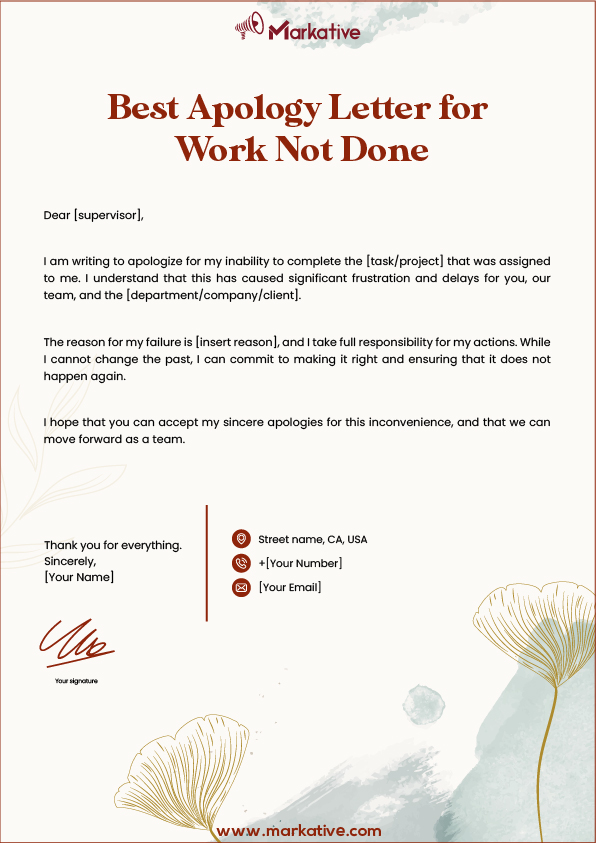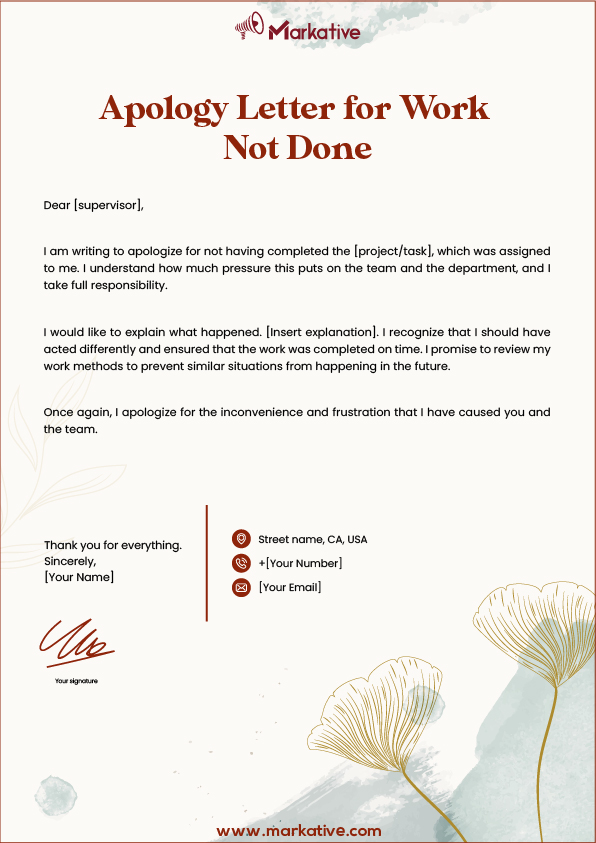An apology letter is a written or typed message expressing regret to someone who has been harmed, offended, or inconvenienced. It’s particularly important in a professional setting when you have failed to complete a task or project that was expected of you. Writing an apology letter for work not done is not an easy task, but here are some tips on how to do it, along with some ready-made templates to get you started. Let’s jump into it!
What to include in a Apology Letter for Work Not Done
An apology letter for work not done should be professional and to the point. It should include the following details in order to be considered sincere and effective:
- Acknowledge your mistake: Begin by acknowledging your mistake. Address your supervisor or recipient and explain to them what you did wrong, and how it impacted the situation.
- Apologize: Offer an apology to the person you are writing to. Be sincere and contrite.
- Explain what happened: Provide an explanation of why the work was not done. You may cite any challenges or obstacles that you faced, but it is important to take full responsibility for the situation.
- Offer a solution: To rectify the situation, offer a solution. This could be a plan for finishing the work, or any other steps you plan to take to prevent similar situations in the future.
- Conclusion: End the letter with a note of appreciation or a message of your intention to improve. Thank the recipient for taking the time to read your letter.
For More: Best Apology Letter for Being Late to Office & 7 Samples

Ready-made templates for a Apology Letter for Work Not Done
Apology Letter for Not Completing Work :
Dear [supervisor],
I’m writing to express my sincerest apologies for not completing [task/project]. I understand that my lack of follow-through has caused significant inconvenience to our team and [company/client].
I completely understand how important this task/project was, and I take full responsibility for my actions that led to it not being completed. Despite having extended hours at work and putting in more time, I failed to deliver the work as promised.
Moving forward, I’d like to make it right for everyone involved and after reviewing my pending tasks, I’m confident I’ll be able to deliver the completed work by [new deadline].
I’d like to reiterate how sorry I am for the inconvenience I’ve caused. I look forward to submitting the completed work as soon as possible and ensuring that this doesn’t happen again.
Sincerely,
[Your Name]Apology Letter for Failure in Work :
Dear [supervisor],
I want to apologize for my failure to complete the [project/task] on time. I’m aware that this has caused a delay in the [department/company’s/client's] schedule and for that, I’m truly sorry.
The reason for my failure to complete the work is [insert reason]. I take full responsibility for allowing this circumstance to occur, and I recognize how important and time-sensitive the task was.
I assure you that I understand the gravity of the situation and that I will make every effort to meet our agreed-upon deadlines in the future. If there are any additional steps I can take to make up for the delay, I’d like to know.
Thank you for understanding and for your patience during this time.
Respectfully,
[Your Name]For More: Attractive Behavior Apology Letter: 9 Ready Samples
Apology Letter for Inability in Task:
Dear [supervisor],
I am writing to apologize for my inability to complete the [task/project] that was assigned to me. I understand that this has caused significant frustration and delays for you, our team, and the [department/company/client].
The reason for my failure is [insert reason], and I take full responsibility for my actions. While I cannot change the past, I can commit to making it right and ensuring that it does not happen again.
To that end, I have identified a plan of action to complete this task. I will start working on it today, and I should be able to submit it to you by [new deadline]. I am also willing to work overtime or the weekend if necessary.
I hope that you can accept my sincere apologies for this inconvenience, and that we can move forward as a team.
Sincerely,
[Your Name]Apology Letter for Incomplete Work:
Dear [supervisor],
I am writing to apologize for not completing the [task/project] you assigned to me on [date]. I understand that the delay has caused setbacks for [department/company/client] and for that, I’m truly sorry.
I take full responsibility for not prioritizing the work, and I understand that this has caused a problem for other people. It was due to my negligence and inability to manage my workload. I’m currently working to reorganize my priorities to avoid this happening again.
To remedy the situation, I will complete the task by [new deadline]. I have already created a new schedule and time management system to ensure that I don't repeat this mistake.
Please know that I am committed to doing everything possible to make sure this kind of situation doesn't happen again. I would like to thank you for your patience and understanding.
Sincerely,
[Your Name]For More: Professional Apology Letter: 7 Ready Samples
Apology Letter for Unfinished Work
Dear [supervisor], I am writing to apologize for not having completed the [project/task], which was assigned to me. I understand how much pressure this puts on the team and the department, and I take full responsibility. I would like to explain what happened. [Insert explanation]. I recognize that I should have acted differently and ensured that the work was completed on time. I promise to review my work methods to prevent similar situations from happening in the future. I have reorganized my schedule to prioritize the task, and I'm confident that I will deliver the work as soon as possible. Under the circumstances, I understand that meeting the original deadline is no longer feasible, so I propose [new deadline]. Once again, I apologize for the inconvenience and frustration that I have caused you and the team. Best regards, [Your Name]

Key takeaways
An apology letter for work not done is a professional way to express regret and responsibility for a mistake or delay. When writing an apology letter, remember to acknowledge your mistake, offer an apology, explain what happened, offer a solution, and conclude with a note of appreciation or improvement. Use the provided templates as a framework, but tailor your letter to your specific context and situation.
Some key takeaways include:
- Be sincere and contrite.
- Take full responsibility for your actions and acknowledge what went wrong.
- Offer a proposed solution to rectify the situation.
- Focus on the future and how you plan to prevent similar situations from happening.
Writing an apology letter is not easy, but doing so sincerely and effectively can help you maintain a positive professional relationship with your colleagues and superiors.







